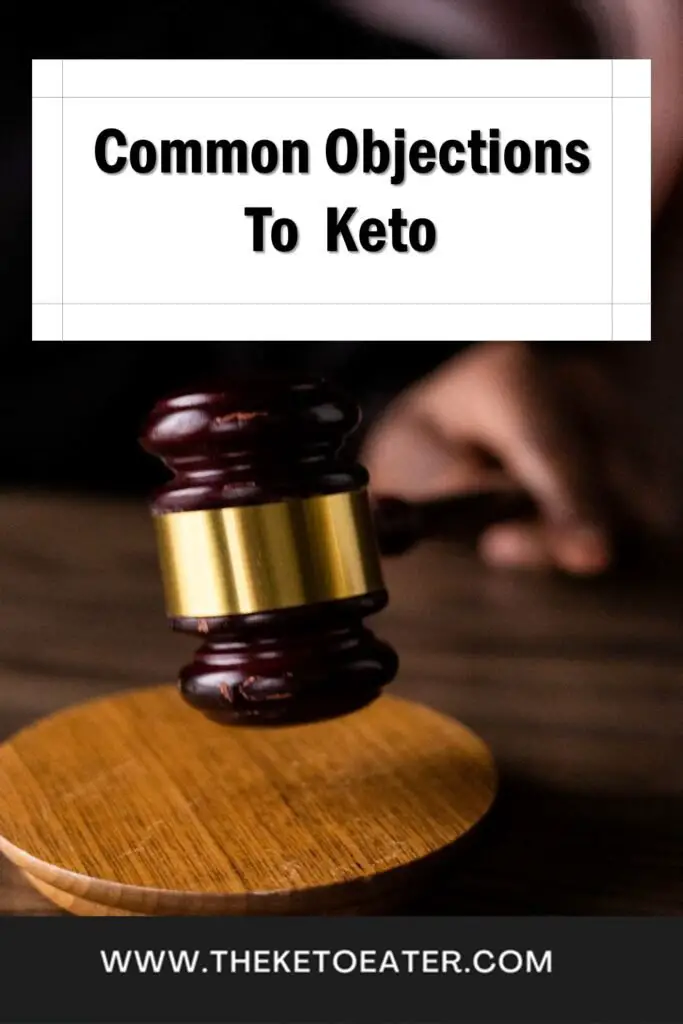The ketogenic diet has become increasingly popular over the last 20 years, with many people touting its potential health benefits. However, there are still some common objections to the keto diet that can make it difficult for some people to commit to this lifestyle. In this article, we will discuss some of the most common objections to a keto diet and provide insight into why they are not valid concerns. I would take you through some of the main objections I have heard, and how I overcame these.
Disclosure: Some of the links in this article may be affiliate links, meaning that we may earn a small commission if you click through using our link and make a purchase. Please be assured that this will not cost you any extra money. Also, please be assured that we either use the products we recommend personally, or have been recommended by trusted friends who currently use them.
Starting a keto diet can be difficult when you have to face objections from friends and family. Many people may not understand the benefits of the keto diet and may worry that it is too restrictive or unhealthy.
They may also think that it will be difficult to stick with such a strict eating plan.

It is important to remember that the keto diet can be very beneficial for many people, and it is possible to make small changes in order to make it more manageable.
With patience and understanding, you can help your friends and family understand why you are choosing this lifestyle and how they can support you in your journey.
So, less talking, let’s have a look at some of the most common objections to the keto diet, and how to overcome these.
These objections are in no particular order but are the most common objections that members of our community have told us that they have come up against.
Objection 1: Eating Fat Is Bad For You
Eating fat is bad for you is a common objection to the keto diet. This misconception stems from the fact that many people associate fat with unhealthy eating habits and weight gain.
This is after years of being told that the only way to be healthy and lose weight is by eating a low fat, low-calorie diet.
However, this is not necessarily true. While some fats are unhealthy, such as trans fats, there are also healthy fats that can be beneficial for your health when eaten in moderation.
There are different types of fat, including saturated and unsaturated fats. Saturated fats are found in animal products such as butter and lard, while unsaturated fats come from plant sources such as olive oil and avocados.
Both types of fat can be part of a healthy diet when consumed in moderation. Additionally, certain types of fatty acids like omega-3s have been linked to improved heart health and cognitive function. Both of which are advised on a keto diet.
When following a ketogenic diet, the body enters into a state known as ketosis where it begins to burn fat for fuel instead of carbohydrates.
This process allows the body to become “fat adapted” which means it becomes more efficient at burning fat for energy rather than relying on carbohydrates for energy production.
Eating fat does not necessarily mean that you are eating unhealthy or gaining weight.
Eating the right kinds of fats can provide health benefits such as improved heart health and cognitive function. Therefore, eating fat is not necessarily bad for your health and can even be beneficial when done correctly.
Check out some of the benefits of keto, which come from eating fat.

This is why you will have seen a large increase in keto professionals (doctors, nutritionists, and registered dieticians) advocating the keto diet for health.
This can also be seen in the UK where the National Health Service (which provides advice and medical care for the country) has moved away from campaigns promoting low-calorie diets and has started promoting a keto way of living for optimal health.
Keto objection debunked – eating fat is not always bad for you.
Objection 2: Keto Is Bad for Your Health
Another concern with the keto diet is that it may not provide all of the essential nutrients needed for optimal health.
The lack of fruits, vegetables, and whole grains means that you may not be getting enough vitamins and minerals from your food. This could lead to deficiencies in important vitamins like vitamin C or B12 which are essential for good health.
This is another myth that can soon be debunked.
You can still eat fruit and vegetables on a keto diet, you just need to be selective as to which ones you should and should not eat.
Check out this article for more on the fruits and veg that you can eat, those that should be eaten in moderation, and those to avoid altogether.
You can get all of the vitamins and minerals that you need to keep your body functioning at peak performance from keto friendly foods.
If you find that you are deficient in any vitamins or minerals, supplements can be taken, however, this should not be necessary.
The keto diet has been linked to a number of health benefits, including improved heart health, weight loss, and improved cognitive function.
Studies have also shown that the keto diet can help reduce inflammation in the body. Additionally, research suggests that the keto diet may be beneficial for those suffering from epilepsy and other neurological disorders.
In terms of specific health conditions that can be helped by eating a keto diet, studies have found that it can help improve symptoms of type 2 diabetes by reducing insulin resistance and improving blood sugar control. It has also been found to reduce triglycerides and LDL cholesterol levels while increasing HDL cholesterol levels.
Furthermore, research suggests that the keto diet may be beneficial for those suffering from polycystic ovary syndrome (PCOS) due to its ability to reduce insulin levels and improve hormone balance. Overcoming this can be beneficial for those who are trying to conceive.
Finally, some studies suggest that the keto diet may be helpful in treating certain types of cancer by reducing tumor growth and improving survival rates. Studies on this are still in their early days.
Overall, there are numerous potential health benefits associated with following a ketogenic lifestyle.
Keto objection debunked – eating keto is not bad for your health.
Objection 3: Keto Is Only For Weight Loss
This article has already highlighted a number of health benefits of keto, such as improved heart health, weight loss, improved cognitive function, and reduced inflammation, as well as directly impacting some medical conditions such as epilepsy, or PCOS.
Alongside this, the keto diet can be an effective tool for weight loss. Reducing the number of carbohydrates consumed, which forces the body to use stored fat as its primary source of energy.
This process is known as ketosis and it helps to reduce appetite and cravings, making it easier to stick to a healthy diet.
Additionally, research suggests that following a keto diet may help boost metabolism and increase fat burning.
Overall, the keto diet can be an effective way to support weight loss when combined with regular exercise and a healthy lifestyle.
If that is not enough of an argument that keto is not just about weight loss, weight loss brings with it its own physical and mental health benefits.
Physically, it can help reduce the risk of developing chronic diseases such as diabetes, heart disease, and stroke. It can also improve energy levels and mobility, making it easier to stay active. Additionally, weight loss can lead to improved sleep quality and reduced joint pain.
Mentally, weight loss has been associated with improved self-esteem and body image, increased confidence, and better overall mood.
Studies have also found that losing weight can reduce stress levels and improve mental clarity. Finally, research suggests that those who lose weight may experience an increase in life satisfaction due to feeling more in control of their lives.
Therefore saying that the keto diet is only about weight loss is not accurate. Keto has a much broader impact on an individual’s health than just weight loss.
I can testify to this, keto has given me more confidence, self-esteem, and energy, and this has had a massive impact on my personal and professional life.
Keto objection debunked – eating keto is not only for weight loss, there are numerous health benefits.
Objection 4: Keto is Just Like the Atkins Diet
The Atkins diet and the keto diet are both low-carbohydrate diets that have been used for weight loss. However, there are some key differences between them.
The Atkins diet is a four-phase plan that gradually increases carbohydrate intake over time. The first phase of the diet allows for zero grams of carbohydrates per day, while the fourth and final phase allows up to 120 grams of carbohydrates per day.
Additionally, the Atkins diet encourages eating more protein and fat to make up for the lack of carbohydrates.
In contrast, the keto diet is a high-fat, moderate-protein, and consistently low-carbohydrate diet that puts your body into a state of ketosis.
This means that your body burns fat instead of glucose as its primary source of energy. The goal is to keep your daily carbohydrate intake below 20 grams per day (although some will go as high as 50 grams per day) in order to stay in ketosis.
Unlike the Atkins diet, which gradually increases carbohydrate intake over time, the keto diet requires you to maintain a strict level of carbohydrate intake throughout your entire journey.
Often, when people have achieved their goals through the keto diet, they will transition onto a low carb diet, or a low carb diet combined with intermittent fasting, in order to maintain their weight loss, but allow a bit of extra flexibility in their diet.
Overall, both diets can be effective tools for weight loss when combined with regular exercise and a healthy lifestyle. However, it’s important to note that each one is different. Some will suit different people.
Keto objection debunked: although the keto diet and Atkins have some similarities, they are not the same
Objection 5: You Never Eat Carbs on Keto
Although the keto diet is about reducing carbs to under 20 grams a day, this does not mean that you can never eat carbs.
As discussed above, the Atkins diet restricts you to zero carbs in the first phase. Keto is never that restrictive.
20 grams of carbs a day is actually a relatively large amount and means that you can enjoy a wide variety of foods on keto.
That being said, the keto diet does not allow for ‘cheat days‘ which have become popular with other diets, especially low carb diets.
Keto objection debunked: you can eat some carbs on keto
Objection 6: Keto is Not Sustainable
The keto diet may not be sustainable for everyone due to its restrictive nature. It requires individuals to drastically reduce their carbohydrate intake which can be difficult for some people to maintain over time.
Additionally, some people may find it difficult to adhere to the strict guidelines of the diet and may struggle with cravings or feelings of deprivation.
Above are all the objections that keto is not sustainable, however, below are some arguments as to why it is in fact, a sustainable way of living.
The keto diet is a sustainable way of eating because it encourages the consumption of healthy, nutrient-dense foods such as vegetables, nuts, seeds, and healthy fats.
Additionally, research has found that following a ketogenic diet can lead to long-term weight loss and improved metabolic health.
Furthermore, studies have shown that people who follow the keto diet are more likely to stick with it than those who follow other diets, this is no doubt due to the health and weight loss benefits spurring people to continue with this way of eating.
This suggests that the keto diet is a sustainable way of eating for many people. Also, I have been eating keto for over 15 years, as have many, many people who can be found in the active keto communities, they are evidence enough that keto is sustainable.
Keto objection debunked: keto is definitely sustainable.
Objection 7: The Second You Stop Eating Keto, You’ll Put All Of The Weight Back On
It is true that if you return to a high carb diet after following the keto diet, you are likely to put all of the weight back on. This is because when you stop eating keto, your body will no longer be in a state of ketosis and will start to crave carbohydrates.
However, if you transition onto a low carb diet or a low carb diet combined with intermittent fasting, you are less likely to put all of the weight back on when you stop eating keto.
This is because these diets still restrict carbohydrate intake but allow for more flexibility than the strict guidelines of the keto diet.
Keto objection debunked: transitioning onto a low carb or low carb/intermittent fasting combination can help maintain your weight loss and prevent putting all of the weight back on when stopping keto.
Objection 8: You Can’t Socialize On Keto
It is possible to socialize on the keto diet, even when eating out. Many restaurants now offer keto-friendly options such as salads, grilled meats and vegetables, and low-carb sides. Additionally, you can ask for substitutions such as replacing a high-carb side dish with a low-carb alternative.
If you plan ahead and research the menu of the restaurant you are going to, you will be able to find keto-friendly options that will fit into your diet.
You can also bring snacks with you if you know that there won’t be any suitable options available at the restaurant.
Keto objection debunked: it is possible to socialize on the keto diet by planning ahead and researching menus or even bringing snacks with you.
Objection 9: You Have To Eat Carbs To Survive
It is a common misconception that you need to eat carbs in order to survive. While it is true that modern diets are largely composed of carbohydrates, the body has actually adapted to using carbs (glucose) for fuel because that is what is available to it.
Studies have shown that the brain functions more efficiently when burning fat for fuel rather than carbohydrates. This means that the body can easily switch from relying on carbs for energy to relying on fat instead.
Therefore, it is possible to survive without eating a high number of carbs and still maintain optimal health by following a ketogenic diet.
Keto objection debunked: The body can easily switch from relying on carbs for energy to relying on fat instead, making it possible to survive without eating carbs and still maintain optimal health by following a ketogenic diet.
Objection 10: You Cannot Eat Keto If You’re Vegan or Vegetarian
It is possible to follow a vegan or vegetarian keto diet. While animal products are typically the main source of protein and fat on the keto diet, there are plenty of plant-based alternatives that can be used to meet your macronutrient needs.
These include nuts, seeds, avocados, coconut oil, olive oil, nut butters, and tofu.
Additionally, there are many vegan and vegetarian friendly low-carb vegetables such as broccoli, cauliflower, spinach, kale, and Brussels sprouts.
By combining these plant-based sources of protein and fat with low-carb vegetables you can easily create delicious vegan or vegetarian meals that fit into the keto diet.
Keto objection debunked: It is possible to follow a vegan or vegetarian keto diet by combining plant-based sources of protein and fat with low-carb vegetables.
Objection 11: You Cannot Eat Keto If You’re Lactose Intolerant
It is possible to follow a keto diet if you are lactose intolerant. There are plenty of dairy alternatives that can be consumed on a keto diet, such as almond milk, coconut milk, and flax milk.
Additionally, there are many lactose-free kinds of cheese available on the market that can be used in place of regular cheese.
These dairy alternatives provide an excellent source of fat and protein for those following a keto diet while still being suitable for those with lactose intolerance.
Furthermore, there are many other sources of fat and protein that do not contain any dairy products such as nuts, seeds, avocados, nut butters, and tofu.
Keto objection debunked: It is possible to follow a keto diet if you are lactose intolerant by consuming dairy alternatives such as almond milk or coconut milk and using lactose-free cheeses or other sources of fat and protein such as nuts, seeds, avocados, nut butters, and tofu.
Objection 12: Keto Is Expensive to eat
In fact, many people on the keto diet end up spending less on food as they often feel fuller and stay fuller for longer, so eat less.
By shopping smart and taking advantage of sales and discounts you can easily find affordable keto-friendly foods that fit into your budget, and it certainly does not need to be more expensive than your current eating habits.
I can testify to this, my grocery bill has dropped by around a third, and now I buy better quality ingredients (and prices have gone up!).
Keto objection debunked: Contrary to popular belief, following a keto diet does not have to be expensive.
Wrapping Up: Common Objections To The Keto Diet Debunked
In conclusion, the keto diet is a great way to improve your health and lose weight. While there are some common objections to the keto diet, these can all be debunked with proper research and understanding of the diet. With plant-based alternatives, dairy alternatives, and affordable options available, anyone can follow a keto diet regardless of dietary restrictions or budget. With the right knowledge and dedication, you can easily make the keto diet work for you.


